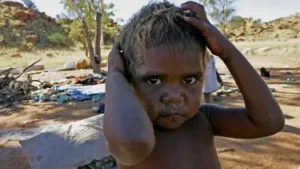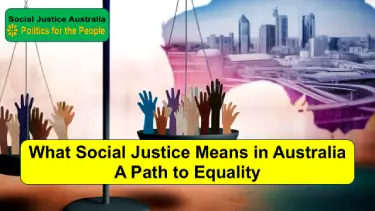Description:
Explore how social justice in Australia can be achieve through monetary sovereignty & ethical policy reforms. Learn about wealth inequality, Indigenous rights.
Introduction
Social justice in Australia is not just an ideal—it is a necessity for creating a society where everyone has equal access to resources, opportunities, and rights. However, the country faces deep-rooted challenges, particularly under neoliberal policies that have prioritized corporate interests over the public good.
The growing wealth inequality, Indigenous rights violations, and the erosion of public services all stand as significant barriers to achieving true social justice.
This comprehensive guide will explore what social justice means in Australia today, the impact of neoliberalism, and how citizens can work towards a more compassionate, fair, and ethical political system. Through restructuring public policies and using Australia’s monetary sovereignty, we can ensure that every citizen receives the support and opportunities they deserve.
Understanding Social Justice in the Australian Context
Definition of Social Justice
Social justice refers to the fair distribution of wealth, opportunities, and privileges within a society. In Australia, this means ensuring that every individual, regardless of their socio-economic background, ethnicity, or location, has access to essential services such as healthcare, education, and housing. It also means protecting the rights of marginalized groups and addressing historical injustices.
Historical Overview
 Historically, Australia has struggled with deep-seated inequality, particularly concerning its Indigenous population. While the post-war era saw significant strides towards equality, including the establishment of public healthcare and education systems, the rise of neoliberal policies in the late 20th century reversed many of these gains.
Historically, Australia has struggled with deep-seated inequality, particularly concerning its Indigenous population. While the post-war era saw significant strides towards equality, including the establishment of public healthcare and education systems, the rise of neoliberal policies in the late 20th century reversed many of these gains.
Today, social justice is still an ongoing battle, with Indigenous Australians still facing systemic disadvantages, and wealth inequality becoming more pronounced.
Neoliberal Impact
Neoliberalism, with its emphasis on free-market economics and reduced government intervention, has profoundly affected Australia’s social policies. Under neoliberal governments, public services have been privatised or scaled back, leading to a widening gap between the wealthy and the rest of the population. This shift has led to underfunded public services, reduced access to affordable housing, and an overall increase in wealth inequality.
The Role of Neoliberal Policies in Eroding Social Justice
What Is Neoliberalism?
 Neoliberalism is a political and economic philosophy that emphasizes minimal government intervention in the market, deregulation, and privatization of public assets. While proponents argue that it encourages economic growth and individual freedom, in practice, it has often led to increased inequality and reduced access to essential services for those who need them most.
Neoliberalism is a political and economic philosophy that emphasizes minimal government intervention in the market, deregulation, and privatization of public assets. While proponents argue that it encourages economic growth and individual freedom, in practice, it has often led to increased inequality and reduced access to essential services for those who need them most.
Historical Impact in Australia
Neoliberalism took root in Australia during the 1980s, with both major political parties adopting policies that favoured market-based solutions to public issues. Key industries, such as telecommunications, energy, and transportation, were privatized. Public services like education and healthcare were defunded, and welfare programs were cut. As a result, those in lower-income brackets found it increasingly difficult to access the resources they needed to improve their socio-economic standing.
Effects on Public Services
Neoliberal policies have had a direct impact on the accessibility and quality of public services in Australia. Privatization and funding cuts have eroded public institutions, making healthcare, education, and housing less affordable and accessible.
– The Dismantling of Public Education: The defunding of Technical and Further Education (TAFE) institutions and the rise of private educational providers have limited access to affordable, high-quality education.
– Housing Crisis: Neoliberal policies have worsened Australia’s housing affordability crisis, with an increasing reliance on private developers to meet public housing needs, which has failed to keep up with demand.
Wealth Inequality and Its Connection to Social Justice
Current State of Wealth Inequality
Australia is experiencing an unprecedented level of wealth inequality. According to the Australian Bureau of Statistics, the wealthiest 20% of households now control more than 60% of the nation’s wealth, while the bottom 20% hold just 1%. This disparity has been further worsened by neoliberal policies that prioritize corporate profits over social welfare.
Corporate Interests vs. Public Needs
Corporations have an outsized influence on Australian politics, particularly through political donations and lobbying. This has led to policies that favour corporate tax cuts, deregulation, and privatization—further enriching the wealthy while reducing public services for ordinary Australians.
Addressing the Gap
Addressing wealth inequality in Australia requires progressive taxation reforms, such as higher taxes on the wealthy and corporations, and increased investment in public services. By redistributing wealth more equitably, Australia can ensure that all citizens have access to the resources they need to thrive.
Indigenous Rights and Social Justice
Historical Injustices
For over 200 years, Indigenous Australians have faced systemic discrimination, dispossession of land, and cultural erasure. These injustices continue to affect Indigenous communities today, manifesting in lower life expectancy, higher incarceration rates, and limited access to quality education and healthcare.
Current Challenges
Indigenous Australians are overrepresented in the criminal justice system, accounting for 30% of the prison population despite making up only 3% of the total population. They also face significant health disparities, with life expectancy for Indigenous people being approximately 8 years shorter than for non-Indigenous Australians.
A Path Forward
Achieving social justice for Indigenous Australians requires not only addressing these disparities but also recognizing their sovereignty and right to self-determination.
– Closing the Gap Initiative: Launched in 2008, this program aims to reduce Indigenous disadvantage across a range of social and economic indicators. However, progress has been slow, and many targets are still unmet.
– The Uluru Statement from the Heart: This landmark 2017 statement calls for the establishment of a First Nations Voice to Parliament and the creation of a Makarrata Commission.
The Makarrata Commission is a proposed body that would oversee a process of truth-telling and agreement-making between the Australian government and Indigenous peoples. The term “Makarrata” is a Yolngu word meaning “coming together after a struggle,” symbolizing reconciliation and justice. The commission’s goals include:
1. Truth-telling: Documenting and acknowledging the historical injustices suffered by Indigenous Australians, including land dispossession, violence, and systemic discrimination.
2. Agreement-making: Facilitating formal agreements, or treaties, between Indigenous groups and governments, ensuring Indigenous sovereignty is recognized and respected.
The Makarrata Commission is part of the broader push for constitutional recognition and was a key element of the 2017 Uluru Statement from the Heart. It aims to promote healing and create a more just relationship between Indigenous and non-Indigenous Australians.
Achieving True Social Justice in Australia
Holistic Approaches
True social justice needs an integrated approach that addresses economic, social, and environmental factors. This means restructuring public policies to ensure that everyone has equal access to healthcare, education, housing, and employment opportunities, regardless of their socio-economic background.
Reforming Public Services
Reinvesting in public services is essential for achieving social justice. Fully funded public services can provide a safety net for those who are struggling and ensure that everyone has the support they need to lead a dignified life.
– Healthcare for All: While Australia’s Medicare system provides universal healthcare, out-of-pocket costs for treatments and specialist services are still a barrier for many. Expanding Medicare to cover all essential health services, including dental and mental health, would help to reduce these disparities.
– Education as a Right: Ensuring that every Australian has access to free, high-quality education is key to reducing inequality and promoting social mobility. This requires reinvesting in public schools and TAFEs and reversing the trend towards privatization.
– Public Housing: The government must commit to building sufficient public housing to meet the needs of all Australians. This would not only reduce homelessness but also alleviate the financial burden on low-income families who are struggling to afford private rentals.
The Roadblocks to Social Justice: Corporate Power and Political Apathy
Political Influence of Corporations
Corporations wield considerable influence over Australian politics, often at the expense of ordinary citizens. Political donations and lobbying efforts by large corporations have resulted in policies that help the wealthy while neglecting the needs of the broader population.
Citizens’ Role in Change
Despite these challenges, Australians have the power to demand change. By engaging in grassroots activism, voting for candidates who prioritize social justice, and holding elected officials accountable, citizens can push for the policies that will create a fairer society.
Moving Forward: Policy Recommendations and Public Action
Policy Changes
To achieve social justice, Australia needs bold policy reforms that address the root causes of inequality and provide support for those who are most vulnerable.
– Wealth Redistribution: Implementing progressive tax reforms, such as increasing taxes on the wealthy and large corporations, would generate the revenue needed to fund essential public services.
– Public Accountability: Transparency measures, such as requiring political parties to show all donations and lobbying activities, would help to reduce corporate influence on policymaking.
Grassroots Movements
Community-driven movements have the potential to enact real change. By joining forces with like-minded individuals and organizations, Australians can advocate for policies that promote social justice and equality.
Call to Action
If you believe in the importance of social justice, now is the time to act. Get involved in local activism, engage with your elected representatives, and demand that they support policies that prioritize the well-being of all Australians, not just the wealthy elite.
Summary
Achieving social justice in Australia is a complex but necessary goal. By addressing wealth inequality, recognizing Indigenous rights, and reforming public services, we can create a society where every individual could succeed. This requires bold political action, citizen engagement, and a commitment to fairness and equity. The solutions are within our reach, but they require us all to take part in making them a reality.
Question for Readers
How do you think Australia can best address the systemic barriers to social justice?
Call to Action
Visit our “Reader Feedback” menu. Let us know how our content has inspired you. Submit your testimonial and help shape the conversation today! And leave a comment about the article below.
Social Sharing
Share this article with your friends and followers to spread the message about the importance of social justice in Australia. Together, we can make a difference!

